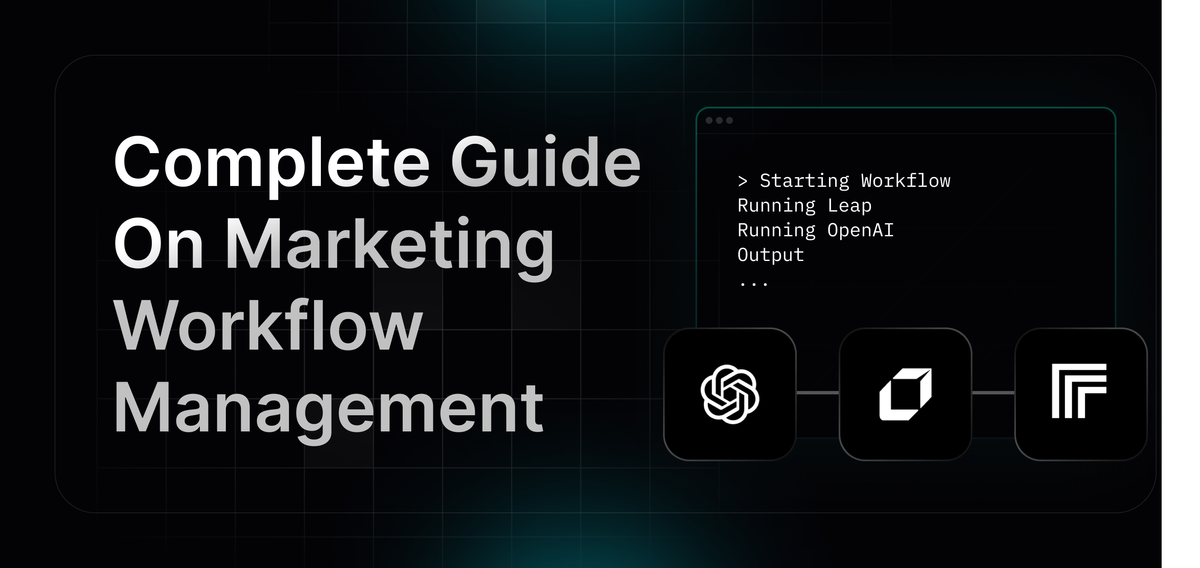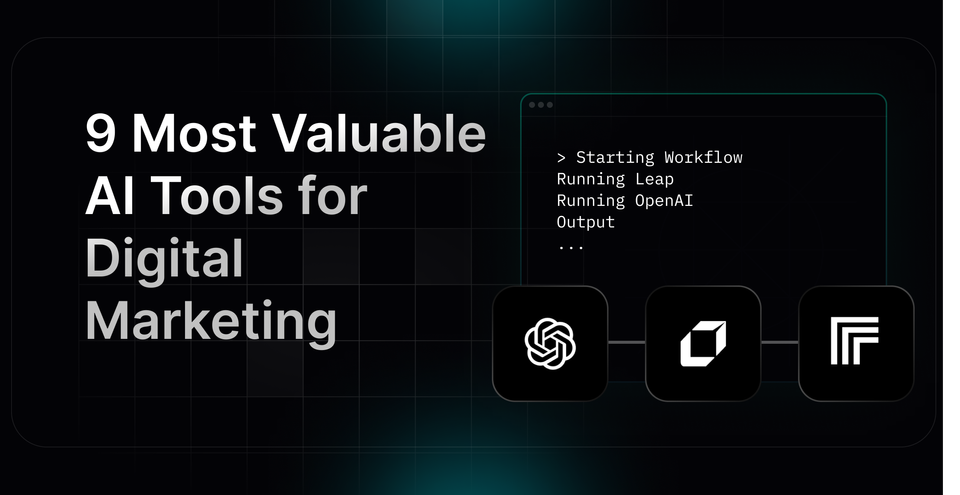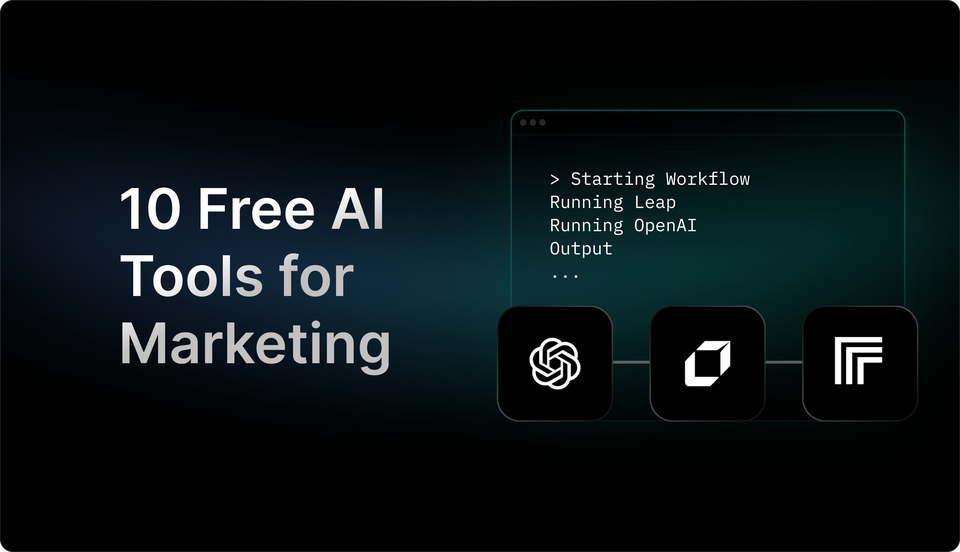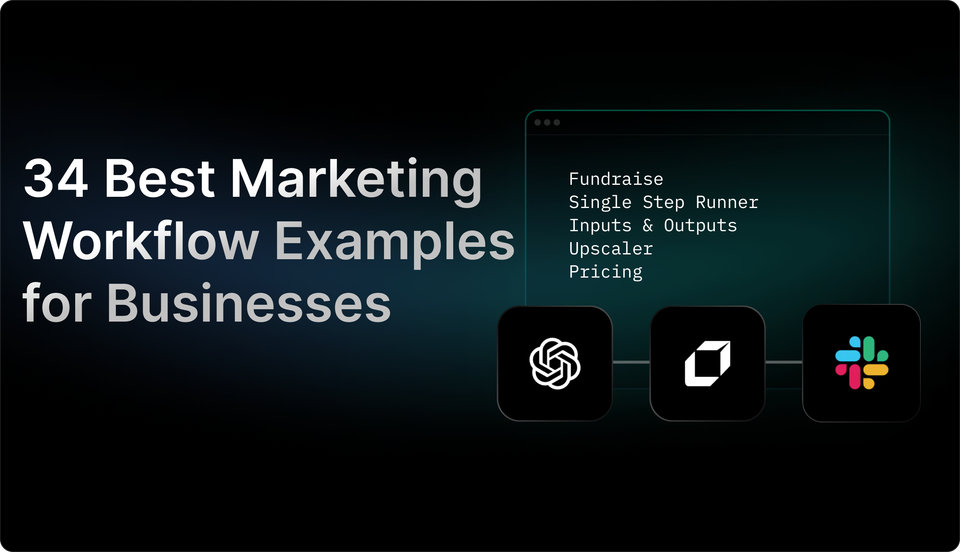Complete Step-by-Step Guide On Marketing Workflow Management
Explore seamless marketing workflow management. Streamline tasks, enhance collaboration, and boost productivity for marketing success.

In today's fast-paced world of marketing, staying organized and efficient is key to success. That's where marketing workflow management comes in. It's the secret weapon that allows marketers to streamline their processes, collaborate effectively, and ultimately, drive results. Whether you're a small business owner wearing multiple hats or a marketing professional juggling multiple campaigns, mastering marketing workflow management is a game-changer.
But what exactly is marketing workflow management? In a nutshell, it's the strategic approach to planning, executing, and analyzing marketing activities in a systematic and organized manner. It involves defining tasks, assigning responsibilities, setting deadlines, and tracking progress, all to ensure that every marketing initiative runs smoothly.
With marketing workflow management, you can eliminate bottlenecks, avoid costly mistakes, and optimize your resources to achieve your goals effectively. So if you're ready to take your marketing workflow to the next level, buckle up and join us on this journey to unravel the secrets of marketing workflow management. Get ready to supercharge your marketing efforts and drive unprecedented results!

What Is Marketing Workflow Management?

Marketing workflow management is a systematic approach to planning, organizing, and executing marketing tasks and activities within a team or organization. It involves the coordination of people, processes, and resources to ensure that marketing projects are completed efficiently and effectively.
Streamlining Success
Marketing workflow management helps streamline the marketing process, from initial ideation and planning to final execution and analysis. It provides a structured framework for managing all the steps and tasks involved in marketing campaigns, ensuring that everyone on the team is on the same page and working towards the same goals.
Task Mastery
With marketing workflow management, the entire marketing process is broken down into smaller, manageable tasks that are assigned to specific team members. Each task is given a deadline and dependencies may be established to ensure that tasks are completed in the correct order. This allows for better collaboration, accountability, and transparency within the team.
Boosting Quality and Productivity
By implementing marketing workflow management, organizations can improve productivity, reduce errors, and enhance the overall quality of marketing campaigns. It provides a clear roadmap for all team members, allowing them to focus on their individual responsibilities while contributing to the larger marketing objectives.
Efficiency Unleashed
Marketing workflow management enables teams to identify bottlenecks and inefficiencies in the marketing process. By analyzing the workflow, teams can identify areas for improvement and optimize their processes to achieve better results. This continuous improvement cycle helps teams become more efficient and effective over time.
Marketing workflow management is a strategic approach that helps companies streamline their marketing efforts, increase productivity, and deliver better results. By providing a structured framework for managing marketing tasks and activities, helps teams stay organized, collaborate effectively, and achieve their marketing objectives.
Related Reading
- Content Marketing Workflows
- Ai For Small Business Marketing
- Email Marketing Workflows
- Digital Marketing Workflow

Why Do You Need A Marketing Workflow?

Efficiently managing marketing workflows is crucial for businesses looking to achieve success in their marketing efforts. Marketing workflow management refers to the process of organizing and streamlining marketing tasks, activities, and approvals to ensure smooth and effective execution. We will explore the reasons why businesses need a marketing workflow and how it can benefit their overall marketing strategy.
1. Enhanced Collaboration and Communication
A well-structured marketing workflow facilitates collaboration and communication among team members. By clearly defining tasks, responsibilities, and deadlines, everyone involved in the marketing process knows what needs to be done, who is responsible for it, and when it is due. This reduces confusion, minimizes misunderstandings, and encourages effective communication, which ultimately leads to improved team collaboration.
2. Improved Efficiency and Productivity
Implementing a marketing workflow management system helps businesses streamline their marketing processes, making them more efficient and productive. By breaking down complex projects into smaller, manageable tasks and assigning them to the right team members, businesses can ensure that every marketing activity is completed on time and in the most effective way. Setting clear deadlines and providing visibility into each task's progress helps eliminate bottlenecks, prioritize tasks, and prevent delays.
3. Consistency and Brand Compliance
Maintaining brand consistency is crucial for businesses to establish a strong brand image and build trust with their target audience. Marketing workflow management allows businesses to create standardized templates, guidelines, and approval processes, ensuring that all marketing assets adhere to the brand's guidelines and messaging. By enforcing brand compliance, businesses can deliver consistent and cohesive marketing messages across different channels, reinforcing their brand identity and increasing brand recognition.
4. Risk Mitigation and Compliance
Marketing workflows that include compliance checks and approvals help businesses mitigate risks associated with regulatory requirements, legal issues, and industry standards. By incorporating compliance checkpoints and involving relevant stakeholders in the approval process, businesses can ensure that their marketing campaigns adhere to internal policies, legal regulations, and industry best practices. This reduces the risk of legal consequences, reputational damage, and financial losses caused by non-compliant marketing activities.
5. Optimal Resource Allocation and Budget Management
Efficient marketing workflow management allows businesses to allocate resources effectively and manage their marketing budgets more efficiently. By having a clear overview of ongoing marketing projects, businesses can identify resource gaps, reallocate resources as required, and align budgets with strategic priorities. This helps avoid over or underutilization of resources, reduces unnecessary expenses, and maximizes the return on investment (ROI) of marketing initiatives.
6. Continuous Improvement and Learning
Implementing a marketing workflow management system provides businesses with the opportunity to collect data, track metrics, and analyze performance. By gaining insights into the effectiveness of various marketing activities, businesses can identify areas for improvement, optimize processes, and enhance future marketing campaigns. Continuous learning and improvement based on data-driven insights ensure that businesses stay ahead of the competition and adapt to evolving market trends and consumer preferences.
Having a well-structured marketing workflow is essential for businesses looking to achieve efficiency, consistency, compliance, and success in their marketing efforts. By implementing a marketing workflow management system, businesses can enhance collaboration, improve efficiency, foster brand compliance, mitigate risks, optimize resource allocation, and drive continuous improvement in their marketing strategies.
The Best Marketing Workflows

Implementing effective marketing workflows is essential for businesses to streamline their processes, improve productivity, and boost their overall marketing performance. A well-defined and optimized marketing workflow management system can help businesses efficiently manage their marketing campaigns, from ideation to execution, and ultimately drive better results. We will explore the best marketing workflows for businesses.
1. Content Creation and Approval Workflow
Content creation is the backbone of any successful marketing strategy. A content creation and approval workflow establishes a systematic process for creating, reviewing, and approving content assets. This workflow typically involves content ideation, research, writing, editing, design, and final approval stages. By implementing this workflow, businesses can ensure that their content aligns with their brand voice, meets quality standards, and is delivered on time.
2. Lead Generation Workflow
A lead generation workflow aims to attract, capture, and nurture leads through various marketing channels. This workflow typically involves the creation and promotion of lead magnets, landing pages, email marketing campaigns, and automated lead nurturing sequences. By implementing this workflow, businesses can effectively generate and nurture leads, leading to increased conversions and revenue.
3. Social Media Marketing Workflow
Social media has become an integral part of most businesses' marketing strategies. A social media marketing workflow helps businesses effectively manage their social media presence and engage with their target audience. This workflow typically involves content planning, scheduling, posting, monitoring, and analyzing social media activities. By implementing this workflow, businesses can ensure consistent and engaging social media content, increase brand visibility, and drive audience engagement.
4. Email Marketing Workflow
Email marketing remains one of the most effective channels for reaching and engaging with customers. An email marketing workflow helps businesses automate and streamline their email marketing efforts. This workflow typically involves list segmentation, email design and copywriting, automation setup, testing, and analytics. By implementing this workflow, businesses can deliver personalized and targeted email campaigns, nurture leads, and drive conversions.
5. Analytics and Reporting Workflow
Measuring and analyzing marketing performance is crucial for businesses to make data-driven decisions and optimize their marketing efforts. An analytics and reporting workflow helps businesses gather, analyze, and report on key marketing metrics. This workflow typically involves data collection, analysis, visualization, and reporting. By implementing this workflow, businesses can gain valuable insights into their marketing performance, identify areas for improvement, and track the overall effectiveness of their marketing campaigns.
6. Project Management Workflow
Effective project management is essential for successful marketing campaigns. A project management workflow helps businesses efficiently plan, execute, and monitor marketing projects. This workflow typically involves task assignment, deadline tracking, collaboration, and project status updates. By implementing this workflow, businesses can ensure that marketing projects are completed on time and within budget, improving overall team efficiency and productivity.
Implementing the best marketing workflows for businesses is crucial for achieving marketing success. By establishing and optimizing workflows for content creation, lead generation, social media marketing, email marketing, analytics and reporting, and project management, businesses can streamline their marketing processes, improve productivity, and drive better results.
Related Reading
- Marketing Automation Workflows
- Content Marketing Workflow
- Digital Marketing Agency Workflow
- Digital Marketing Workflows
- Marketing Workflow Examples
How No-Code Work Automation Tools Help With Marketing Workflow Management

Effective workflow management is essential for success. No-code work automation tools have emerged as a powerful solution to streamline and optimize marketing processes. These tools allow marketers to automate repetitive tasks, improve collaboration, and increase productivity. Let's explore how these tools can be utilized in marketing workflow management.
1. Streamlining Task Management
No-code work automation tools provide marketers with the ability to create custom workflows that automatically assign tasks, set deadlines, and track progress. By automating task management, marketers can ensure that every team member knows their responsibilities and deadlines, reducing the risk of missed deadlines and bottlenecks.
2. Automating Data Collection and Analysis
One of the most time-consuming aspects of marketing is collecting and analyzing data from various sources. No-code work automation tools can integrate with different data platforms and APIs, allowing marketers to automate data collection, consolidation, and analysis. This automation saves valuable time and enables marketers to make data-driven decisions faster.
3. Enhancing Collaboration
Effective collaboration is crucial in marketing workflow management, especially when multiple teams and stakeholders are involved. No-code work automation tools offer features like real-time notifications, task assignment, and document sharing, facilitating seamless collaboration across teams. This improves communication, reduces miscommunication, and ensures that everyone is on the same page.
4. Optimizing Content Creation and Publishing
Content creation and publishing are integral parts of marketing workflows. No-code work automation tools can automate content creation processes by integrating with AI-powered tools. These tools can generate content outlines, suggest topic ideas, proofread content, and even create visual assets. By automating content creation, marketers can save time, maintain consistency, and improve the quality of their content.
5. Integrating Marketing Tools
No-code work automation tools often come with integrations for popular marketing tools like email marketing platforms, CRM systems, social media management tools, and more. These integrations enable marketers to automate repetitive tasks, such as sending personalized emails, updating customer records, and scheduling social media posts. By integrating these tools, marketers can create a seamless workflow across different platforms, increasing efficiency and eliminating manual work.
6. Tracking and Analyzing Performance
Measuring the performance of marketing campaigns is essential for optimization and ROI analysis. No-code work automation tools can automate the process of tracking key performance indicators (KPIs), generating reports, and analyzing data. Marketers can set up automated workflows to collect data from different sources, calculate metrics, and generate reports in real-time. This automation allows marketers to make data-driven decisions faster and optimize their marketing efforts effectively.
No-code work automation tools are revolutionizing marketing workflow management by enabling marketers to automate repetitive tasks, enhance collaboration, and optimize processes. With the power of AI and seamless integrations with popular marketing tools, these tools can supercharge marketing workflows and improve productivity. Leap offers a comprehensive solution for marketing workflow automation, empowering marketers to harness the power of AI without the need for coding. Try Leap's Workflows tool for free today and experience the endless opportunities for automation in marketing workflow management.
Common Challenges for Implementing Marketing Workflow Management & How To Overcome Them

Implementing marketing workflow management can be a complex and challenging process. By identifying and addressing these common challenges, teams can successfully overcome them and streamline their marketing operations.
1. Lack of Clarity and Alignment
One of the most common challenges in implementing marketing workflow management is the lack of clarity and alignment within the team. All team members must have a clear understanding of their roles, responsibilities, and objectives. Without this clarity, tasks can be duplicated, deadlines can be missed, and overall productivity can be affected.
To overcome this challenge, teams should establish clear communication channels, set expectations, and provide regular updates and feedback. Using project management tools and software can help visualize workflows, assign tasks, and track progress, ensuring everyone is on the same page.
2. Inefficient Processes and Bottlenecks
Inefficient processes and bottlenecks can significantly hinder marketing workflow management. These bottlenecks can occur due to dependencies on specific team members, outdated tools, or lack of automation. As a result, tasks may be delayed, projects may be stalled, and resources may be underutilized.
To overcome this challenge, teams should conduct a thorough analysis of their existing processes and identify areas for improvement. By streamlining processes, eliminating unnecessary steps, and leveraging automation tools, teams can reduce bottlenecks and increase overall efficiency.
3. Lack of Collaboration and Communication
Collaboration and communication are essential for successful marketing workflow management. Remote teams, different time zones, and poor communication platforms can hinder effective collaboration. Without proper communication, important information can be missed, and tasks can be delayed.
To overcome this challenge, teams should invest in collaboration and communication tools that facilitate real-time communication, file sharing, and task management. Regular team meetings, both in-person and virtual, should be scheduled to foster collaboration and ensure everyone is on track. Establishing a centralized repository for marketing assets and resources can help improve communication and avoid duplication of efforts.
4. Resistance to Change
Implementing marketing workflow management often requires a shift in mindset and a change in established processes. Resistance to change can come from individual team members or from the overall corporate culture. This resistance can hinder the adoption and effectiveness of the new workflow management system.
To overcome this challenge, teams should focus on educating team members about the benefits of the new system and the impact it can have on their work. Providing training and support during the transition period can also help alleviate resistance. Involving team members in the decision-making process and seeking their input can increase buy-in and acceptance of the new workflow management system.
Implementing marketing workflow management may come with challenges, but by addressing issues such as lack of clarity, inefficient processes, poor collaboration, and resistance to change, teams can overcome these challenges and achieve streamlined and efficient marketing operations.
Create Game Changing Automations Today With Leap’s AI Workflows
Leap is a groundbreaking tool that leverages the power of AI to automate and streamline your marketing workflow management. By partnering with industry-leading platforms like Zapier and Vercel, Leap empowers you to create custom AI automations without any coding knowledge. With its seamless integration of AI text, image, and audio models, Leap allows you to connect and supercharge your favorite marketing tools.
Supercharge Your Work with Custom AI Automations
Gone are the days of manual, repetitive tasks in marketing workflow management. Leap's Workflows tool enables you to harness the capabilities of AI to automate a wide range of tasks. Whether you need to summarize documents, translate voice recordings, transcribe calls, generate AI avatars and assets, or automate SEO processes, Leap has got you covered. With its flexibility and versatility, Leap opens up a world of possibilities for automation in marketing.
Seamlessly Connect Your Favorite Tools with Best-in-Class AI Models
Leap understands that marketers have their preferred set of tools and software. That's why it offers seamless integrations with OpenAI, Microsoft, and more, allowing you to enhance your existing workflows with cutting-edge AI capabilities. By connecting your favorite tools to Leap, you can create a cohesive ecosystem where AI algorithms work hand in hand with your established marketing stack, revolutionizing your productivity and efficiency.
Unlock Endless Automation Opportunities with Leap Workflows
Marketing workflow management is a complex process with numerous moving parts. Leap Workflows simplifies and amplifies this process by automating virtually anything you can imagine. From organizing and summarizing marketing research data to generating AI-driven content suggestions, Leap enables you to streamline your workflow and focus on higher-value tasks. With the power of AI at your fingertips, the possibilities for automation are truly endless.
Try Leap's Workflows Tool for Free Today
Ready to supercharge your marketing workflow management? Give Leap's Workflows tool a try today, and experience the transformative power of AI automation. With no coding required, you can easily create custom AI automations tailored to your specific needs. Don't miss out on the opportunity to revolutionize your marketing workflow management. Sign up for Leap now and take your productivity to new heights.




